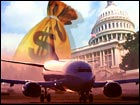|
Airlines get some tax help
|
 |
November 14, 2001: 4:27 p.m. ET
Feds allow airlines to defer some, but not all, taxes until Jan. 15.
By Staff Writer Chris Isidore
|
NEW YORK (CNN/Money) - Airlines got a break on some, but not all, of the federal taxes from which they were seeking relief in the wake of the Sept. 11 terrorist attack.
The nation's passenger airlines had won a deferral of the need to pay about $1 billion in federal excise taxes, such as taxes on fuel, tickets and cargo, as well as payroll taxes until Nov. 15 as part of federal bailout legislation, which also gave the airlines $5 billion in direct aid.
The legislation allowed for an additional delay in payments until Jan. 15 if Treasury Secretary Paul O'Neill decided to grant it. Wednesday O'Neill's office issued a statement saying that the airlines could have until Jan. 15 to make the excise tax payments, but that the payroll taxes were due Thursday.
"Treasury understands the need to allow the airline industry, which was greatly affected by the September 11th attacks, more time in making deposits and payments of their Federal excise taxes," said a statement from Mark Weinberger, the assistant secretary for tax policy.
An official with the Air Transport Association, the trade group for the airlines, said the organization was pleased with the help, even if it wasn't as much help as had been sought.
"Everything that relates to cash matters now," said John Heimlich, the ATA's director of economic and market research. "It would have been helpful to have the payroll taxes deferred, but this will go part of the way."
Heimlich couldn't say how much of the estimated $1 billion in deferred taxes were excise taxes and how much was payroll, nor could a spokeswoman from the Treasury Department. The department's statement was silent as to why the payroll taxes were not deferred.
The airline industry has received about $2.4 billion of the $5 billion in direct aid granted under the legislation. Another round of payments equal to about $1.75 billion is expected later this month Heimlich said.
Airline losses have been mounting since the Sept. 11 attack, due to depressed demand for air travel. Miles flown by paying customers was off about 25 percent in October compared with a year ago, and lower fares meant that revenue was off even more than that. Most major airlines have a large part of their fleet parked due to cutbacks in schedules.
The bailout legislation also allowed for up to $10 billion in loan guarantees. Tuesday Phoenix-based America West Airlines (AWA: Research, Estimates) became the first carrier to apply for that assistance when it applied for $400 million in loan guarantees.
"As the direct result of the terrorist attacks, the arranged liquidity facility will not be completed and, under prevailing economic conditions, other private financing alternatives are not available," said a statement from Douglas Parker, the CEO of America West. Parker had warned during the congressional hearings on the bailout legislation that without help, the airline could be forced to seek bankruptcy protection.
The legislation allows, but does not require, the federal government to take an equity position in airlines that receive loan guarantees. The America West statement does not mention the offer of equity, and an airline spokeswoman could not say if it was included in the application. The airlines' statement said is has received assurances of another $135 million of aircraft financing and an additional $450 million in other concessions, financing and assistance.
Click here for a look at airline stocks
The possibility of giving up equity has served to deter some carriers from seeking loan guarantees, although Heimlich said he would expect at least one other major carrier to file for that assistance by the end of the month. He said part of the delay is due to the complexity of the application process.
"What people are forgetting is just because they're not applying in November doesn't mean they won't apply," he said. 
|
|
|
|
|
|

|

